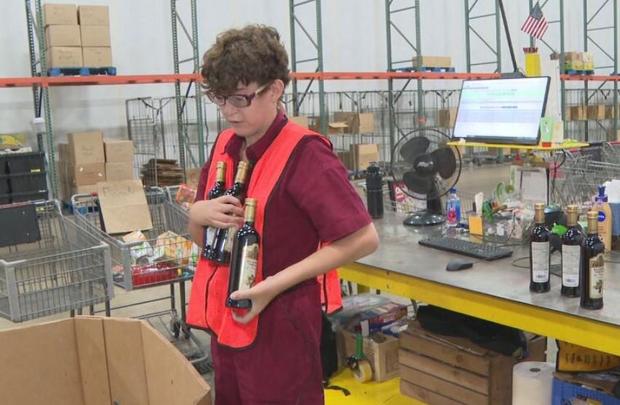Coloradans with intellectual, developmental disabilities help rescue food for food banks

Last year
By Ashley Portillo
Click here for updates on this story
Colorado (KCNC) — Last year, more than six million pounds of food was rescued across Colorado, thanks to a partnership between King Soopers and a group of residents with intellectual and developmental disabilities.
So, instead of unsellable food from local grocery stores going to a landfill, it helps feed local families. It’s all part of the King Soopers Food Rescue Program, and most of the work happens at the Reclamation Center in Aurora.
That’s where a group of local residents are clocking in every day, Monday through Friday, to help with the effort.
Not only are residents like Samantha Mays helping to save millions of pounds food to feed local families, but they also get to earn some money while doing it.
“I have done pretty much every task there is here and those include pulling down the doors, sweeping, putting away donates over there,” said Mays, who has worked at the Reclamation Center for a few years.
Every Tuesday and Thursday, she shows up ready get the job done.
“It gets very tiring. but i’m kind of used to it,” said Mays.
She’s one of more than a dozen residents who help out with the King Soopers Rescue Program, take on the responsibility of sorting and scanning food, and get paid by working at the Reclamation Center.
Jessica Trowbridge with King Soopers says whether it’s a dented can, or a seasonal item, the food that cannot be sold comes from all 153 stores across the state. The food then goes to local nonprofits, thanks to the help of the residents.
“We receive products from stores that we’re not able to sell them but they’re still good for consumers to eat,” said Trowbridge. “Whether its our feeding Colorado partners, or Renver Rescue Mission, we work a lot with incredible organizations who are working to help in that hunger need in our community.”
Residents are not only working to support their community, but they also get to have working jobs of their own.
“I love earning money, because I get paid for this,” said Mays.
“It’s a way for me to earn a living pretty much like everybody else you know,” said Cotee, another resident who works four days a week.
Kodjo Akakpo, the Director of Community Integration and Partnerships for the Division of Regional Center, said their goal is to get residents more involved in the community by having employment opportunities.
“Disability shouldn’t be a reason why somebody cannot work. As you can see, they are very, very productive, and happy with what they are doing here, earning money,” said Akakpo.
Akakpo added that employment is a social determinent of health, and they’ve seen the benefit working has had on the residents.
“You have this possibility of making friends and the possibility of making money,” said Akakpo. “So it has really helped the residents and some of the individuals we support, just coming into that whole full enjoyment of having a job and looking forward to going to work, and being a contributor to the community.”
As for Cotee, this is also his first job, and it’s a job he cherished.
“It’s my favorite job, and its intersting to me because I’ve never worked a real job before, so it’s really exciting for me,” said Cotee.
“I enjoy my job here. love my cowkers. I love my staff. I ove my peers,” said Mays.
According to the U.S. Bureau of Labor and Statistics, in 2023, 22.5% of people with a disability were employed.
The unemployment rate for people with a disability was 7.2%, which was about twice that of those with no disability.
Please note: This content carries a strict local market embargo. If you share the same market as the contributor of this article, you may not use it on any platform.


